115 start with P start with P

The statesman defends a friend and assails an enemy.
Cicero (Marcus Tullius, 106–43 BC), Roman lawyer, orator, politician and philosopher, of whom we know more than of any other Roman, lived through the stirring era that saw the rise, dictatorship, and death of Julius Caesar in a tottering republic. In his political speeches especially and in his correspondence we see the excitement, tension and intrigue of politics and the part he played in the turmoil of the time. Of about 106 speeches, delivered before the Roman people or the Senate if they were political, before jurors if judicial, fifty-eight survive (a few of them incompletely). In the fourteenth century Petrarch and other Italian humanists discovered manuscripts containing more than 900 letters of which more than 800 were written by Cicero and nearly 100 by others to him. These afford a revelation of the man all the more striking because most were not written for publication. Six rhetorical works survive and another in fragments. Philosophical works include seven extant major compositions and a number of others; and some lost. There is also poetry, some original, some as translations from the Greek.
The Loeb Classical Library edition of Cicero is in twenty-nine volumes.

Hippocrates, said to have been born in Cos in or before 460 BCE, learned medicine and philosophy; travelled widely as a medical doctor and teacher; was consulted by King Perdiccas of Macedon and Artaxerxes of Persia; and died perhaps at Larissa. Apparently he rejected superstition in favour of inductive reasoning and the study of real medicine as subject to natural laws, in general and in individual people as patients for treatment by medicines and surgery. Of the roughly 70 works in the 'Hippocratic Collection' many are not by Hippocrates; even the famous oath may not be his. But he was undeniably the 'Father of Medicine'.
The works available in the Loeb Classical Library edition of Hippocrates are the following. Volume I: Ancient Medicine. Airs, Waters, Places. Epidemics 1 and 3. The Oath. Precepts. Nutriment. Volume II: Prognostic. Regimen in Acute Diseases. The Sacred Disease. The Art. Breaths. Law. Decorum. Physician (Ch. 1). Dentition. Volume III: On Wounds in the Head. In the Surgery. On Fractures. On Joints. Mochlicon. Volume IV: Nature of Man. Regimen in Health. Humours. Aphorisms. Regimen 13. Dreams. Volume V: Affections. Diseases 12. Volume VI: Diseases 3. Internal Affections. Regimen in Acute Diseases. Volume VII: Epidemics 2 and 47. Volume VIII: Places in Man. Glands. Fleshes. Prorrhetic III. Physician. Use of Liquids. Ulcers. Haemorrhoids and Fistulas. Volume IV also contains the fragments of Heracleitus, On the Universe.

To the practical modern mind, the idea of divine prophecy is more ludicrous than sublime. Yet to our cultural forebears in ancient Greece and Rome, prophecy was anything but marginal; it was in fact the basic medium for recalling significant past events and expressing hopes for the future, and it offered assurance that divinities truly cared about mere mortals. Prophecy also served political ends, and it was often invoked to support or condemn an emperor's actions. In Prophets and Emperors, David Potter shows us how prophecy worked, how it could empower, and how the diverse inhabitants of the Roman Empire used it to make sense of their world.
This is a fascinating account of prophecy as a social, religious, and political phenomenon. The various systems of prophecy--including sacred books, oracles, astrological readings, interpretation of dreams, the sayings of holy men and women--come into sharp relief. Potter explores the use of prophecy as a nieans of historical analysis and political communication, and he describes it in the context of the ancient city. Finally, he traces the reformation of the prophetic tradition under the influence of Christianity in the fourth century.
Drawing on diverse evidence--from inscriptions and ancient prophetic books to Greek and Roman historians and the Bible--Potter has produced a study that will engage anyone interested in the religions of the ancient Mediterranean and in the history and politics of the Roman Empire.
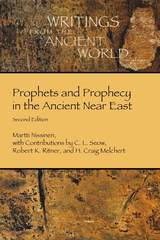
A new, expanded edition of a classic reference tool
This volume of more than 170 documents of prophecy from the ancient Near East brings together a representative sample of written documents from Mesopotamia, the Levant, and Egypt dating to the second and first millennia BCE. Nissinen's collection provides nonspecialist readers clear translations, transliterations, and discussions of oracles reports and collections, quotations of prophetic messages in letters and literature, and texts that reference persons with prophetic titles. This second edition includes thirty-four new texts.
Features:
- Modern, idiomatic, and readable English translations
- Thirty-four new translations
- Contributions of West Semitic, Egyptian, and Luwian sources from C. L. Seow, Robert K. Ritner, and H. Craig Melchert
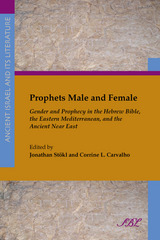
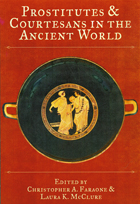
Prostitutes and Courtesans in the Ancient World explores the implications of sex-for-pay across a broad span of time, from ancient Mesopotamia to the early Christian period. In ancient times, although they were socially marginal, prostitutes connected with almost every aspect of daily life. They sat in brothels and walked the streets; they paid taxes and set up dedications in religious sanctuaries; they appeared as characters—sometimes admirable, sometimes despicable—on the comic stage and in the law courts; they lived lavishly, consorting with famous poets and politicians; and they participated in otherwise all-male banquets and drinking parties, where they aroused jealousy among their anxious lovers.
The chapters in this volume examine a wide variety of genres and sources, from legal and religious tracts to the genres of lyric poetry, love elegy, and comic drama to the graffiti scrawled on the walls of ancient Pompeii. These essays reflect the variety and vitality of the debates engendered by the last three decades of research by confronting the ambiguous terms for prostitution in ancient languages, the difficulty of distinguishing the prostitute from the woman who is merely promiscuous or adulterous, the question of whether sacred or temple prostitution actually existed in the ancient Near East and Greece, and the political and social implications of literary representations of prostitutes and courtesans.
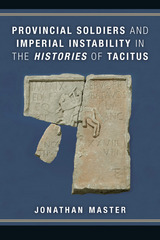
Master draws on scholarship in political theory, Latin historiography, Roman history, and ethnic identity to demonstrate how Tacitus presented to his contemporary audience in Trajanic Rome the dangerous consequences of the city’s failure to reward and incorporate its provincial subjects. Master argues that Tacitus’ presentation of the Vitellian and Flavian armies, and especially the Batavian auxiliary soldiers, reflects a central lesson of the Histories: the Empire’s exploitation of provincial manpower (increasingly the majority of all soldiers under Roman banners) while offering little in return, set the stage for civil wars and ultimately the separatist Batavian revolt.

Spirited verse.
Prudentius (Aurelius Prudentius Clemens) was born in AD 348 probably at Caesaraugusta (Saragossa) and lived mostly in northeastern Spain, but visited Rome between 400 and 405. His parents, presumably Christian, had him educated in literature and rhetoric. He became a barrister and at least once later on an administrator; he afterwards received some high honor from Emperor Theodosius. Prudentius was a strong Christian who admired the old pagan literature and art, especially the great Latin poets whose forms he used. He looked on the Roman achievement in history as a preparation for the coming of Christ and the triumph of a spiritual empire.
The Loeb Classical Library edition of the poems of Prudentius is in two volumes. Volume I presents: “Preface” (Praefatio); “The Daily Round” (Liber Cathemerinon); twelve literary and attractive hymns, parts of which have been included in the Breviary and in modern hymnals; “The Divinity of Christ” (Apotheosis), which maintains the Trinity and attacks those who denied the distinct personal being of Christ; “The Origin of Sin” (Hamartigenia) attacking the separation of the “strict” God of the Old Testament from the “good” God revealed by Christ; “Fight for Mansoul” (Psychomachia), which describes the struggle between (Christian) Virtues and (Pagan) Vices; and the first book of “Against the Address of Symmachus” (Contra Orationem Symmachi), in which pagan gods are assailed.
The second volume contains the second book of “Against the Address of Symmachus,” opposing a petition for the replacement of an altar and statue of Victory; “Crowns of Martyrdom” (Peristephanon Liber), fourteen hymns to martyrs mostly of Spain; “Lines To Be Inscribed under Scenes from History” (Tituli Historiarum), forty-nine four-line stanzas that are inscriptions for scenes from the Bible depicted on the walls of a church; and an Epilogue.

Spirited verse.
Prudentius (Aurelius Prudentius Clemens) was born in AD 348 probably at Caesaraugusta (Saragossa) and lived mostly in northeastern Spain, but visited Rome between 400 and 405. His parents, presumably Christian, had him educated in literature and rhetoric. He became a barrister and at least once later on an administrator; he afterwards received some high honor from Emperor Theodosius. Prudentius was a strong Christian who admired the old pagan literature and art, especially the great Latin poets whose forms he used. He looked on the Roman achievement in history as a preparation for the coming of Christ and the triumph of a spiritual empire.
The Loeb Classical Library edition of the poems of Prudentius is in two volumes. Volume I presents: “Preface” (Praefatio); “The Daily Round” (Liber Cathemerinon); twelve literary and attractive hymns, parts of which have been included in the Breviary and in modern hymnals; “The Divinity of Christ” (Apotheosis), which maintains the Trinity and attacks those who denied the distinct personal being of Christ; “The Origin of Sin” (Hamartigenia) attacking the separation of the “strict” God of the Old Testament from the “good” God revealed by Christ; “Fight for Mansoul” (Psychomachia), which describes the struggle between (Christian) Virtues and (Pagan) Vices; and the first book of “Against the Address of Symmachus” (Contra Orationem Symmachi), in which pagan gods are assailed.
The second volume contains the second book of “Against the Address of Symmachus,” opposing a petition for the replacement of an altar and statue of Victory; “Crowns of Martyrdom” (Peristephanon Liber), fourteen hymns to martyrs mostly of Spain; “Lines To Be Inscribed under Scenes from History” (Tituli Historiarum), forty-nine four-line stanzas that are inscriptions for scenes from the Bible depicted on the walls of a church; and an Epilogue.
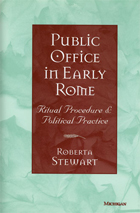
---Bryn Mawr Classical Review
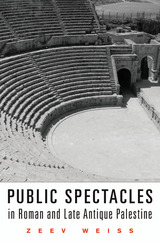
Public Spectacles in Roman and Late Antique Palestine introduces readers to the panoply of public entertainment that flourished in Palestine from the first century BCE to the sixth century CE. Drawing on a trove of original archaeological and textual evidence, Zeev Weiss reconstructs an ancient world where Romans, Jews, and Christians intermixed amid a heady brew of shouts, roars, and applause to watch a variety of typically pagan spectacles.
Ancient Roman society reveled in many such spectacles—dramatic performances, chariot races, athletic competitions, and gladiatorial combats—that required elaborate public venues, often maintained at great expense. Wishing to ingratiate himself with Rome, Herod the Great built theaters, amphitheaters, and hippodromes to bring these forms of entertainment to Palestine. Weiss explores how the indigenous Jewish and Christian populations responded, as both spectators and performers, to these cultural imports. Perhaps predictably, the reactions of rabbinic and clerical elites did not differ greatly. But their dire warnings to shun pagan entertainment did little to dampen the popularity of these events.
Herod’s ambitious building projects left a lasting imprint on the region. His dream of transforming Palestine into a Roman enclave succeeded far beyond his rule, with games and spectacles continuing into the fifth century CE. By then, however, public entertainment in Palestine had become a cultural institution in decline, ultimately disappearing during Justinian’s reign in the sixth century.
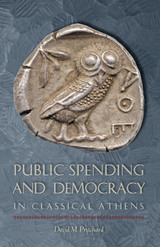
In his On the Glory of Athens, Plutarch complained that the Athenian people spent more on the production of dramatic festivals and “the misfortunes of Medeas and Electras than they did on maintaining their empire and fighting for their liberty against the Persians.” This view of the Athenians’ misplaced priorities became orthodoxy with the publication of August Böckh’s 1817 book Die Staatshaushaltung der Athener [The Public Economy of Athens], which criticized the classical Athenian dēmos for spending more on festivals than on wars and for levying unjust taxes to pay for their bloated government. But were the Athenians’ priorities really as misplaced as ancient and modern historians believed?
Drawing on lines of evidence not available in Böckh’s time, Public Spending and Democracy in Classical Athens calculates the real costs of religion, politics, and war to settle the long-standing debate about what the ancient Athenians valued most highly. David M. Pritchard explains that, in Athenian democracy, voters had full control over public spending. When they voted for a bill, they always knew its cost and how much they normally spent on such bills. Therefore, the sums they chose to spend on festivals, politics, and the armed forces reflected the order of the priorities that they had set for their state. By calculating these sums, Pritchard convincingly demonstrates that it was not religion or politics but war that was the overriding priority of the Athenian people.

Ancient Rome’s longest epic.
Silius Italicus (T. Catius, AD 25–101), was consul in 68 and governor of the province of Asia in 69; he sought no further office but lived thereafter on his estates as a literary man and collector. He revered the work of Cicero, whose Tusculan villa he owned, and that of Virgil, whose tomb at Naples he likewise owned and near which he lived. His epic Punica, in seventeen books, on the second War with Carthage (218–202 BC), is based for facts largely on Livy’s account. Conceived as a contrast between two great nations (and their supporting gods), championed by the two great heroes Scipio and Hannibal, his poem is written in pure Latin and smooth verse filled throughout with echoes of Virgil above all (and other poets); it exploits with easy grace, but little genius, all the devices and techniques of traditional Latin epic.
The Loeb Classical Library edition of Silius Italicus is in two volumes.

Ancient Rome’s longest epic.
Silius Italicus (T. Catius, AD 25–101), was consul in 68 and governor of the province of Asia in 69; he sought no further office but lived thereafter on his estates as a literary man and collector. He revered the work of Cicero, whose Tusculan villa he owned, and that of Virgil, whose tomb at Naples he likewise owned and near which he lived. His epic Punica, in seventeen books, on the second War with Carthage (218–202 BC), is based for facts largely on Livy’s account. Conceived as a contrast between two great nations (and their supporting gods), championed by the two great heroes Scipio and Hannibal, his poem is written in pure Latin and smooth verse filled throughout with echoes of Virgil above all (and other poets); it exploits with easy grace, but little genius, all the devices and techniques of traditional Latin epic.
The Loeb Classical Library edition of Silius Italicus is in two volumes.

During the Aegean Bronze Age (ca. 3000–1500 BCE), the spread of woolen textiles triggered an increased demand for color. The dyes included those made from the labor-intensive processing of crocus stamens for saffron dye and even more costly dyes made from certain sea snails (the Muricidae/Murex). Minoan and Mycenaean textile producers (the palaces) operated mainly in the Black Sea region, rich in gold. “Purpled world” is Morris Silver’s term for this emergent ideology.
In Part I of The Purpled World, Silver demonstrates how the palaces embedded commercial motivation into traditional rituals, played out in purpose-built textile exhibition spaces, including labyrinths. In Part II, he mines textual, archaeological, and iconographic evidence to reveal the international textile trade. In Parts III and IV, Homer’s Trojan War is seen as a trade war, and Homeric heroes have roles as traders and/or agents for Poseidon. In Part V, Silver considers the before-and-after of this “purpled world”: Jason and the Argonauts, and the so-called collapse of the Mycenaean Palaces as a manifestation of vertical disintegration in the Aegean textile industry. The Purpled World integrates all these forms of evidence with interpretative insights from Maslovian psychology, as well as the disciplines of fashion studies, marketing, and economics.
READERS
Browse our collection.
PUBLISHERS
See BiblioVault's publisher services.
STUDENT SERVICES
Files for college accessibility offices.
UChicago Accessibility Resources
home | accessibility | search | about | contact us
BiblioVault ® 2001 - 2024
The University of Chicago Press









